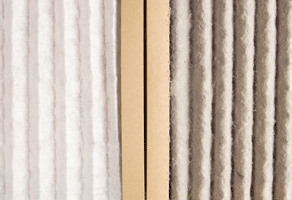As you’re probably all too aware, Southwest Arizona is a fairly dusty environment, which means that the air filter for your cooling and heating equipment works harder to keep your equipment and air clean. Clean filters keep conditioning bills low and extend equipment life. As a side benefit, these filters also improve indoor air quality by trapping unwanted airborne particulates.
Filters carry MERV (minimum efficiency reporting value) ratings that show how effectively a given filter traps airborn e particulates. For residential use, the scale runs from 1 to 16, with higher-rated filters trapping more and smaller particles. In most cases, the filters for residential HVAC equipment shouldn’t exceed a MERV rating of 12, without system modifications. Anything higher can impede airflow, which damages equipment, increases energy bills, and erodes performance.
e particulates. For residential use, the scale runs from 1 to 16, with higher-rated filters trapping more and smaller particles. In most cases, the filters for residential HVAC equipment shouldn’t exceed a MERV rating of 12, without system modifications. Anything higher can impede airflow, which damages equipment, increases energy bills, and erodes performance.
Those fiberglass filters you see in retail stores typically have MERV ratings of 1 to 4, which means they trap particulates no smaller than lint, pollen and dust mite waste. This mainly protects your equipment while not doing much to clean your indoor air.
- MERV 4-8 air filters trap particles as small as cooking or baking mixes, cement dust, and mold spores.
- MERV 8-12 filters trap everything 1-8 filters trap, plus auto emissions, flour, and legionella, the dangerous bacteria that causes some types of pneumonia.
- MERV 13-16 filters everything 1-12 catch, plus bacteria, some tobacco smoke, and the aerosols from sneezing.
Filters that have ratings over 16 fall into the HEPA (high efficiency particulate air) range, which generally are too dense to use unassisted in HVAC equipment. You can use filters over 8-12 in your central cooling and heating equipment with whole-house air filtration systems, but these may require the assistance of an HVAC professional to install.
When you need to replace the filters for your HVAC system, make sure you don’t choose one that exceeds the value that the manufacturer of your equipment recommends. This information can be found in the owner’s manual or by contacting an HVAC pro.
To learn more about the right air filters for your home’s cooling and heating equipment, please contact us at Hansberger Refrigeration & Electric Company. We’ve provided trusted HVAC services for the Yuma area since 1952.
Normal
0
false
false
false
EN-US
X-NONE
X-NONE
/* Style Definitions */
table.MsoNormalTable
{mso-style-name:”Table Normal”;
mso-tstyle-rowband-size:0;
mso-tstyle-colband-size:0;
mso-style-noshow:yes;
mso-style-priority:99;
mso-style-parent:””;
mso-padding-alt:0in 5.4pt 0in 5.4pt;
mso-para-margin:0in;
mso-para-margin-bottom:.0001pt;
mso-pagination:widow-orphan;
font-size:10.0pt;
font-family:”Calibri”,”sans-serif”;}
Our goal is to help educate our customers in Yuma, Arizona about energy and home comfort issues (specific to HVAC systems). For more information about air filters and other HVAC topics, download our free Home Comfort Resource guide.
Image courtesy of Shutterstock

